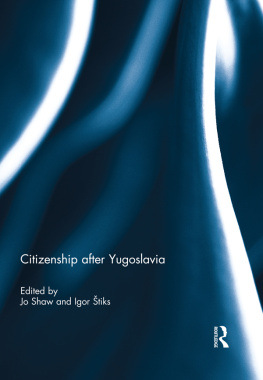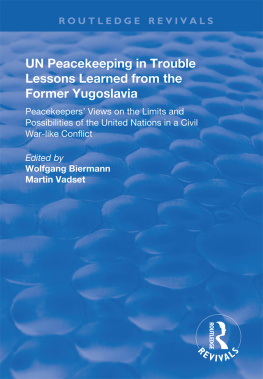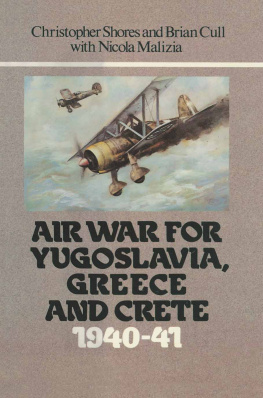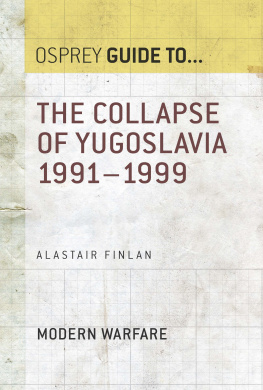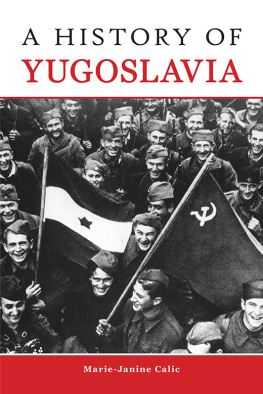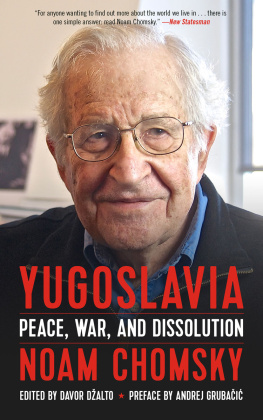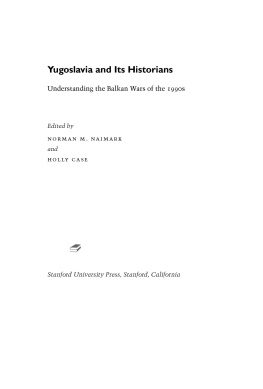Cover

| title | : | Conflict in the Former Yugoslavia: an Encyclopedia Roots of Modern Conflict |
| author | : | Allcock, John B.; Milivojevc, Marko,; Horton, John J. |
| publisher | : | ABC-CLIO |
| isbn10 | asin | : | 0874369355 |
| print isbn13 | : | 9780874369359 |
| ebook isbn13 | : | 9781576074848 |
| language | : | English |
| subject | Yugoslav War, 1991-1995--Dictionaries, Yugoslav War, 1991-1995--Encyclopedias, Yugoslavia , Former Yugoslav republics--History--Dictionaries, History--Dictionaries, Yugoslavia--Encyclopedias.--History , Former Yugoslav republics--Encyclopedias.--History |
| publication date | : | 1998 |
| lcc | : | DR1232.F67 1998eb |
| ddc | : | 949.703 |
| subject | : | Yugoslav War, 1991-1995--Dictionaries, Yugoslav War, 1991-1995--Encyclopedias, Yugoslavia , Former Yugoslav republics--History--Dictionaries, History--Dictionaries, Yugoslavia--Encyclopedias.--History , Former Yugoslav republics--Encyclopedias.--History |
Page i
Conflict in the Former Yugoslavia
Page ii
Roots of Modern Conflict
Page iii
Conflict in the Former Yugoslavia
An Encyclopedia
edited by
John B. Allcock,
Marko Milivojevi,
and John J. Horton
foreword by Martin Bell, M.P.

Denver, Colorado
Santa Barbara, California
Oxford, England
Page iv
Copyright 1998 by John B. Allcock, Marko Milivojevi, and John J. Horton
All maps by C. J. Bowers, University of Bradford
All rights reserved. No part of this publication may be reproduced, stored in a retrieval system, or transmitted, in any form or by any means, electronic, mechanical, photocopying, recording, or otherwise, except for the inclusion of brief quotations in a review, without prior permission in writing from the publishers.
Library of Congress Cataloging-in-Publication Data
Conflict in the former Yugoslavia: an encyclopedia / edited by John B. Allcock, Marko Milivojevi, and John J. Horton.
p. cm.(Roots of modern conflict)
Includes bibliographical references and index.
1. YugoslaviaHistoryDictionaries. 2. Yugoslav War, 19911995Dictionaries. 3. Former Yugoslav republicsHistoryDictionaries. I. Allcock, John B. II. Milivojevi, Marko, 1957. III. Horton, John J. (John Joseph), 1940. IV. Series.
DR1232.F67 1998
949.703dc21 98-41772
CIP
ISBN 0-87436-935-5 (hc)
ISBN 1-57607-045-X (pbk)
04 03 02 01 00 99 98 10 9 8 7 6 5 4 3 2 1
ABC-CLIO, Inc.
130 Cremona Drive, P.O. Box 1911
Santa Barbara, California 93116-1911
This book is printed on acid-free paper.
Manufactured in the United States of America
Page v
To our parents
Page vi
This page intentionally left blank
Page vii
Contents
Foreword, Martin Bell, M.P. ix
Introduction, John B. Allcock, Marko Milivojevi, and John J. Horton xi
List of Contributors xvii
Maps xxiii
Conflict in the Former Yugoslavia: An Encyclopedia
Bibliography
Chronology
Appendix: The Dayton Agreements
Index
Page viii
This page intentionally left blank
Page ix
Foreword
Martin Bell, M.P.
When the history of our time comes to be written, the wars of the dissolution of Yugoslavia will occupy a central place. The Bosnian war in particular dominated the politics and diplomacy of Europe in the mid-1990s. It challenged the New World Order following the end of the Cold War. It exposed the weakness of the Western democracies and the divisions between them. It raised questions about the role and responsibilities of the news media, especially television. It brought war and genocide home to peoplethe first war and genocide in Europe in 50 years. It caused its leading players and more marginal figuressoldiers, politicians, aid workers, and even journaliststo doubt their traditional practices and values and their ways of doing business. We were dealing with new realities.
As is the way with wars, too much blood was spilled in the first instanceand perhaps too much ink in the second. Over the years a literature of the wars of ex-Yugoslavia has come into beingsome of it fiction, some nonfiction, and some occupying a middle ground between them. I must plead guilty to having written one of these books myselfI hope of the truthful variety. There seemed no point in living through such an ordeal without drawing from it the necessary lessons and trying to make them accessible to others.
The Dayton Agreements did not bring peace, but they brought a welcome respite from war. And if the respite holds, it will add to the growing library of books about what happened and why; about leaders and institutions that failed; about cowardice in the face of genocide; about the blame and the shame of it. The passage of time may also, however, provide more heat than light. Already I have sensed a tendency by those who were not present at the time to rewrite history according to their own prejudgments.
How useful then to have on hand a reference workan A-to-Z of the Balkan warsthat can anchor these later theories in the facts. The Former Yugoslavia is that book.
Page x
This page intentionally left blank
Page xi
Introduction
John B. Allcock, Marko Milivojevi, and John J. Horton
As Yugoslavia was falling apart, Serb author Milorad Pavi achieved international fame for his novel A Dictionary of the Khazars. His book both is symptomatic of the process that is dealt with in our own work and resembles it. The Khazar khanate occupied an area to the north of the Black Sea between the early eighth and late tenth centuries, although little is known about it. Pavis Dictionary is a fictional attempt to reconstruct the khanates history and culture on the basis of the few scraps of knowledge that remain. The result is a parable, in Pavis view, of the Serbs and the manner in which the distinctiveness of Serb culture was coming to be dissipated within modern Europe, to the extent that future generations would know as little of his own people as we do today of the Khazars. The sense of a crisis of identity that Pavi expresses is widely present among all of the peoples of former Yugoslavia and is an important dimension of the developments that are the subject of this book.
The unusual feature of Pavis novel was that its form as a dictionary invited the reader to enter it at any point and to consult the entries in any order, in the expectation that following their random cross-referencing would enable a complete picture to eventually emerge. Abandoning the usual narrative structure of the novel, Pavi endeavored to convey an understanding of the situation by other means. This is precisely the hope and expectation of the editors of this book. Like Pavi, we also offer the reader a dictionary. It is a work of reference, whose items may be consulted entirely in isolation from each other in the search for specific information. In the selection of the items that have been included here, however, and in the manner in which they are both consciously cross-referenced and treated internally (note that boldfaced terms in the text of the entries are cross-references to other entry titles), the editors have tried to convey a sense of the totality of the events, as well as their patterned interrelationship, leading to the eventual disintegration of the former Socialist Federation of Yugoslav Republics. The strategy that we have adopted in pursuit of this aim is to intersperse conceptual, historical, and interpretative items among the more narrowly factual ones and to ensure that entries convey something of the meaning of events as well as simply recording the events themselves.
Next page

